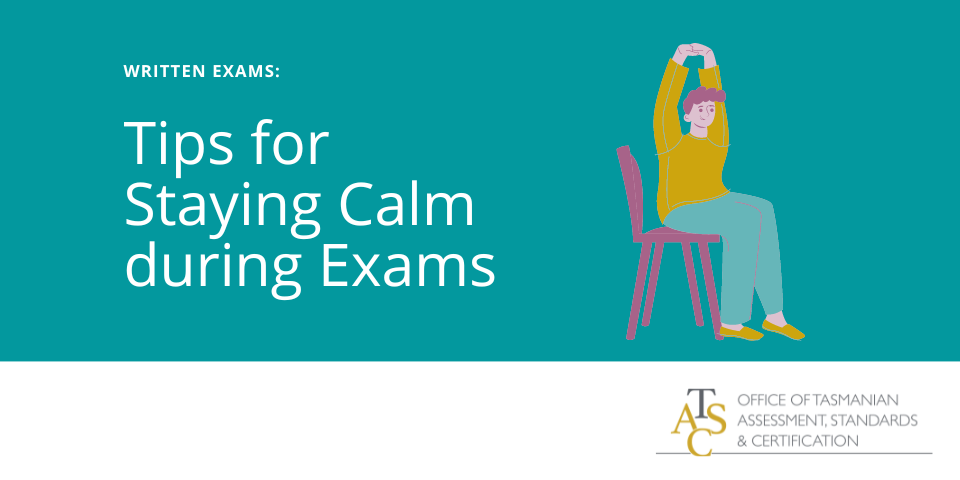
Some practical tips for staying CALM during written exams. Use these to help you relax, think positively and stay focused.
C = Get comfy
- You’re going to be sitting at your allocated desk for a while so get as comfortable as you can. Being comfortable helps you focus on the exam, rather than how your body feels.
- Set out the supplies for your exam on the desk in your preferred order and how you usually work.
- Wear layers of comfortable clothing so you can adjust to suit the temperature of the room. Wearing a zip-up hoodie over a t-shirt can keep you from getting too cold or too hot.
- Try to loosen up as being physically tense will not help you feel better. Try to relax your arms, hands and fingers, and feet and toes. Breathe – use a few slow deep breaths or your favourite breathing exercises to unwind.
A = Adjust your mindset
- Now is the time to become your biggest cheerleader. Go you!
- Use positive self-talk. It’s very easy when you’re stressed to think negative thoughts, but these don’t help you focus. Instead, make a conscious effort to think positively about your abilities and the experience of sitting an exam.
- Banish thoughts of regret or doubt. Even a simple ‘I can do it!’ can make a big difference to your confidence. There may be a lot of questions, but you are here to take them on one-by-one, and you will make it through.
- It might help you to visualise getting through the paper. For instance, imagine the exam paper is a thick jungle, and you are pushing your way through it, question by question.
L = Line it up
- Now you are comfortable, relaxed and in a positive frame of mind, you can plan your approach to the exam.
- When the 15 minutes of preparation time starts, write down any information you are worried about forgetting on the notes paper provided. This could be formulas, definitions, or things to jog your memory. Once you have it written down you can come back to it as you need it.
- Read the whole exam paper and every instruction thoroughly. It’s vital that you understand exactly what’s being asked of you. If you can choose from a few questions, choose the questions you are most confident in and that cover content you know best or most enjoy.
- Plan what order you’ll tackle the questions in. Number, highlight or circle the questions you plan to answer. Tackle the easiest questions first. This builds your confidence and ensures you have a base level of marks before you start dealing with the trickier questions, which may take longer to complete.
- If you have an essay, make a very quick essay plan before you start. Outline a rough structure and the areas you want to cover. This helps you to use your time effectively by only including relevant material, as concisely as possible. Don’t forget to include an introduction and a conclusion that pulls everything together.
M = Manage your time
- You’re working your way through the paper as you planned but make sure to monitor time and maximise the marks you can get for your answers.
- Make sure you are answering the actual question. Don’t forget to pay attention to instructions such as ‘analyse’, ‘examine’ or ‘compare and contrast’ and ensure you do as instructed.
- Closely monitor time. The ‘Guide to the exam structure’ on the inside cover of your exam paper has a suggested working time. Roughly, you should spend about one minute a mark when answering a question (this includes time thinking). If you are running out of time, jot down bullet points of your ideas; you may be able to accrue some partial marks.
- If you get stuck……try tackling a different question and then go back to the one you were stuck on. Focusing on something else for a bit should help clear your mental block and leave you with fresh inspiration for the problem question.
- Check every page of your exam booklet and make sure you have answered every question you need to.
After the Exam
- Congratulate yourself on doing so well! The exam is over – celebrate that! Good job!!

